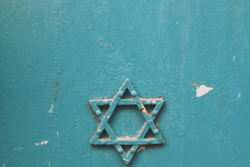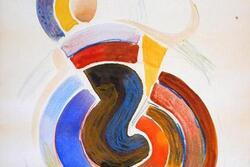Sink or Swim: Antisemitic Jokes Are No Laughing Matter
I was newly thirteen and attending my regular Saturday morning synchronized swimming practice. It was the sixth hour—the gymnastics portion—where we stretched our oversplits on chairs and stood on our toes to perfect their point. After an eighteen-hour week I was exhausted, but my team’s spirit remained joyous. We laughed, and all was good—or so I thought. As we stood awaiting our next instructions, my friend Claire* piped up: “Want to hear a joke?” The sun streamed in the large windows, reflecting our bright attitudes, as we all nodded our heads energetically. She took a deep breath, preparing her quip: “What’s the difference between a pizza and a Jew? One makes it out of the oven.”
The space fell silent and dark as the sun turned its head in shock. She laughed, and I stood paralyzed with a smile while thoughts swarmed through my brain like locusts. She’s German. Was this joke directed at my Jewish faith? She's in the "elite" group and is popular on the team. As her friend, do I correct her or cry?
I grew up sheltered, attending Jewish day school since kindergarten. I studied antisemitism as a hypothetical. It could never happen to me—my non-Jewish friends loved that I invited them to my bat mitzvah, understood when I missed practice for Yom Kippur, and respected me when I didn’t eat the catered ham and cheese sandwiches at competitions. Suddenly I, the confident girl, was speechless—lost in a reality that I thought would never be my own.
So, I laughed as my heart ached. I never told her how badly it hurt, how I still think about it sometimes at night when I can’t sleep. When I think about it now, I cringe realizing my complicity in the face of blatant antisemitism. My great-grandparents suffered and survived Holocaust atrocities. Half of our family perished in the ghettos and camps. Their stories echoed through my Safta and Mom and reverberate across my childhood. How could I have stood there when I—unlike my Polish predecessors—had a voice?
Now, as a more mature feminist, Jew, and student, I grant myself grace for this misstep. And I have some answers to explain my freeze-up and alternative reactions as well. I now understand that it’s not my job alone to educate the prejudice around me. My friends should have admonished Claire.
Yet, I do still think about the reasons why I didn’t speak up. One was that I didn't think I could be marginalized as a Jew due to my privilege. I have a good education, economic advantages, and whiteness. And this realization sheds light on an issue all Jews face while confronting discrimination: our Jewish experience of oppression stands in contradiction to the trope of Jewish dominance in the economy, politics, and media. Our apparent status as the privileged majority suggests that we’re unable to experience hate.
Jews around the world and across time have endured the pressure of conformity. Our safety, rights, and livelihood rely on fitting the “upstanding citizen model.” This goes back to Moses blending in as an Egyptian prince, the Maccabees revolting against assimilation in the Hellenistic period, the story of Hanukkah during the Hellenistic period, the Jews giving their children to monasteries for protection in the Holocaust, and Marranos hiding Jewish traditions in the Spanish Inquisition. Upon seeking refuge in America after centuries of persecution, Jews had to continue this pattern, abandoning Yiddish, Hebrew names, and religious practices. However, in discussions of contemporary anti-Semitism, we don’t often talk about historical assimilation.
I grew up in spaces where intersectionality was a topic of conversation; however, this concept was consistently applied to certain oppressed identities. Intersectionality, it seemed to me, wasn’t something I could harness for myself as a Jew. And this is because the application of the term intersectionality often fails to acknowledge that the Jewish experience is varied and one of assimilation.
Karin Stögner Ph.D., professor in the Department of Sociology and Gender Studies at the University of Vienna, sums up this phenomenon: “In certain strands of intersectionality that implicitly identify Jews with the universal in the shape of white privilege and hegemony, this relationship is reversed. Now, Jews do not represent a particularity that should be erased but rather the universal that is deemed tyrannical and that is the target.”
This phenomenon is harmful twice over. First, it’s false—Jews possess multiple identities impacting our societal privilege. We vary in our ethnicity (Sephardim, Mizrahim, and Ashkenazim), race, socioeconomic status, and sexual preference. Second, even a Jew with every privileged identifier can still experience marginalization because they are Jewish.
This antisemitic joke was hard for me to respond to, and was easy for Claire to say, because the stereotypical Jew balances between the cracks of the minority and the majority, which leaves us even more vulnerable. The flaws in this understanding of intersectionality forced me into a collective that was inaccurate. I didn’t feel that my identifiers were “enough" to be marginalized, so I was ridiculed and reduced to one dimension. I was trapped by the most common Jewish stereotype, from the Protocols of the Elders of Zion, that I was warned of all nine years at my day school: that Jews rule the world.
After reckoning with Claire’s antisemitism, it’s clear to me that intersectionality can be a tool to fight this form of hatred. However, there are several ways in which we can improve its functionality: for example, engaging Jewish organizations to curate curricula for teachers on the Jewish story of assimilation when discussing antisemitism. Listening to individual stories to acknowledge their unique identifiers and the hardship that comes with them. Recognizing that our experiences as Jews and as women are complicated. Critiquing accepted systems as not a calamity, but rather an opportunity to improve humanity.
No one deserves to be the butt of the joke. We must be fierce in our expectations of tolerance and kindness.
*real name is removed
This piece was written as part of JWA’s Rising Voices Fellowship.








Elle — This is the second oven “joke” I’ve read today. Your piece is strong, important, insightful, and well written. Mazel tov. Please keep writing and exploring. Your discoveries will help many. Take a look at micro-aggression as a name for these “jokes.” When I put a slice of bacon on my plate a couple of years ago, a bystander said, “Well, Sieg Heil.” When I confronted her a week or so later (I too froze in the moment), guess what she said? “It’s a joke …” Thanks for writing this ~ Jessica
It's not too late. She might want to contact the person who told the 'joke' and the silent girls who did not speak up. Send a copy of her article and say hope the girls who are now women will be empowered to not remain silent when antisemitism is happening in a conversation.